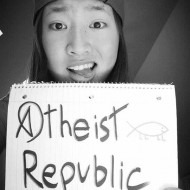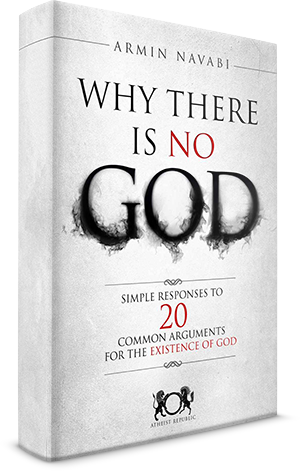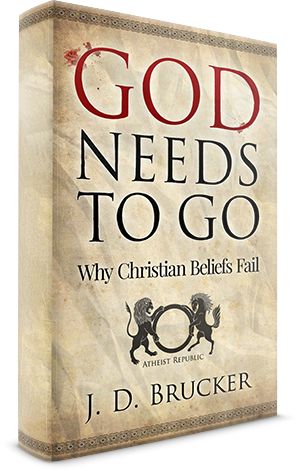Subscription Note:
Choosing to subscribe to this topic will automatically register you for email notifications for comments and updates on this thread.
Email notifications will be sent out daily by default unless specified otherwise on your account which you can edit by going to your userpage here and clicking on the subscriptions tab.




























I really curious to know what point of reference atheists use on how they worship atheism?
Lol, I don't really worship atheism :) I simply don't worship anything theistic!
There is no such a thing as worshiping atheism. The whole purpose of atheism is to not worship anything at all.
in my opinion the point of reference of atheism comes from logic and reason. atheist don´t worship, because there is nothing to worship.
You need to be a theist to be able to worship. The atheist by default of logic is incapable of worship.
It means that atheists would rather believe in variety of scientific theories rather than worshiping the God that no logic can explain. Atheists would rather believe that they came from monkey rather than someone powerful made them; therefore there is no point to worship anyone.
I agree with what most people here have said, and with Mysticrose to an extent, but I feel I should clear a few things up.
1) Atheists do often adhere to logic, reason, and believing in science and scientific theory. For a lot of us, it goes hand in hand with the logical deduction that there is no God, and it is often science and logical thinking that brought us to the conclusion that God does not exist. That said, it is worth remembering that atheism isn't a specific belief, in God, in science, in anything. Though many atheists do believe in science, all atheist means is a disbelief in God. An atheist could easily hold a deep mistrust for science and be a very illogical person, but they can still be an atheist simply by not believing in a God.
2) Mysticrose, I see where you're coming from completely. I'd just like to touch on the phrase 'would rather believe in' if I may. For most atheists - especially those who don't believe in God because they think logically that he cannot exist - they don't believe what they believe because they 'want' to as such. They believe in it because they think it's true, even if they rather it wasn't. To demonstrate, let us consider disease. I believe that disease exists. This isn't because I'd RATHER believe that it exists - I really wish it didn't. But I believe in it anyway because there is so much evidence that it does in fact exist. To return to my original point, many atheists believe in what they believe because the evidence points towards it, even if in their opinion they wished it wasn't the case.
3) This is a small point but while I'm here, I'd just like to clear up a common misconception :) Humans didn't evolve from monkeys; we are both primates but we actually both came from a common ancestor who was also a primate. This is a bit like horses and zebras. They look similar and we can tell that they are related, but zebras didn't evolve into horses or vice versa. They actually had a common ancestor from which they both evolved.
That is some really good information. Being a newbie here, stuff like that really helps out a lot.
Thanks :)
The point of reference for atheism is simply that if there is no logical explanation for something then it doesn't really exist.
Kudos to you Matty Arnold. I recently heard a very good analogy that helps explain atheism for those who misunderstand it.
Say you have a jar of gumballs. Now there are either an odd number or even number of gum balls in this jar. For arguments sake lets say that Theism could be the claim that there are an even number of gumballs. Now Atheism is the opposite of Theism and most would assume that in this case Atheism would be the claim of an odd number of gumballs, however this is not the opposite. The opposite of this claim would be to refute the claim of an even number of gumballs.
Atheism is not a belief in no god(s), it is the dismissal of the claim that there is a god(s).
I would refute the claim that there is no god(s) just as I refute the claim that there is a god(s). There is not evidence that either claim is true.
I could add that Atheism and Agnosticism are not mutually exclusive. I would disagree with an Atheist who told me there are no god(s) because I'm agnostic, we do not know one way or the other.
And therein begins the interesting topic of whether most atheists should really call themselves atheists :) Going by definition, I'm an agnostic. I think that a God cannot be proven or disproved. The connotations associated with agnosticism however are of being unsure, undecided, or even a cop-out. I choose to call myself atheist because though I'm not 100% sure God doesn't exist, I'm very very close to it.
Briefly back to the OP, a 'point of reference' will change from atheist to atheist by virtue of the fact that there are no hard-fast beliefs that we all share. There is no common point of reference for a non-belief in something. It's almost like asking "I really like golf. But what's the point of reference for people who don't like golf? How do they worship not liking golf?"
are you an agnostic towards unicorns...or are you an agnostic towards lepricorns and fairyes ???
Well technically... yes ^^
Again, unicorns probably don't exist. I can't stress how unlikely it is that they exist. But they can't actually be disproved, as there is always the slightest of chances that they do exist. I'm at least 99.99999999999999999999% sure that Unicorns don't exist, but that still isn't 100%. Technically I am an agnostic in this instance, but practically speaking I would call myself an atheist towards unicorns. (Well, not atheist - aunicornist?)
That's pretty much the way I feel - there's no real chance of *proving* anything one way or the other until all the chips are in.
Your analogy is cute, but I'd say that claims of Theism are more in line with claiming that there is a prime number of gumballs in the jar, rather than just an even number vs Atheists' odd number. Given what I know about the world thus far, the odds are far from evenly stacked between theism vs atheism.
Logically, there is no way to even define God in a meaningful way: any definition is either going to be so specific that it can be refuted easily, or so vague as to be meaningless. And as for evidence: it is up to the believers to provide evidence that their God exists, and atheists are under no obligation to prove a negative. That's like demanding that you prove that mermaids, centaurs and Darth Vader don't exist.
One thing is for sure - no one can prove to me that the Teenage Mutant Ninja Turtles don't exist. That's because they do.
If anyone begs to differ, I will personally hold them to the obligation to crawl through every sewer yourself to make sure they *aren't* there. And of course install proper surveillance to make sure that they weren't just out getting pizza or fighting crime during said crawl :)
Atheists are people that don't believe in God or they don't believe in existence of any God and they are mostly scientist.
They are simply skeptical towards any idea presented to them and that's quite a good characteristic.